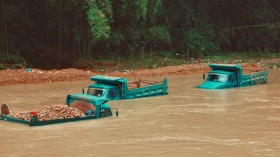Urchins are turning biodiverse kelp forests into barren wasteland, prompting scientists to explore ways to keep these ecosystems alive, new research describes.
"To avoid fishing is not enough to recover these marine habitats. If we want to restore barren grounds and recover kelp forest communities, we can take actions on urchin populations in order to generate structures (to replant algae, for instance) and accelerate the recovery process of these marine habitats," researcher Bernat Hereu from the University of Barcelona said in a statement.
Overfishing wipes out any potential predators that prey on urchin, so as urchin numbers spike, kelp beds consequently suffer.
"Urchins are on the intermediate level of the food web, as they feed on algae and they are prey to fish species," Hereu said.
That's not just bad news for seaweeds that make up these lush kelp beds, but also for the various marine species that call them home. Experts say that it's crucial to learn the key factors involved in promoting the progression of barren grounds, in order to avoid the collapse of natural systems like kelp forests.
According to the study, published in the journal Philosophical Transactions of the Royal Society B: Biological Sciences, Hereu and his colleagues studied 13 different rocky reef systems around the globe. They confirmed that urchins indeed impact kelp forests.
When urchin density arrives to a critical point, they say, the ecological system collapses and turns into a barren ground. Then, in order to recover kelp beds, urchin populations must be very small. To salvage these biologically-rich ecosystem, researchers suggest introducing urchin predators to keep their population numbers in check, promoting urchin fishing and replant algae.
Disappearing kelp forests are just one problem in a "sea of tipping points" marine ecosystems are dealing with. Many iconic habitats, including the Great Barrier Reef, are on the verge of collapse.
For more great nature science stories and general news, please visit our sister site, Headlines and Global News (HNGN).
© 2024 NatureWorldNews.com All rights reserved. Do not reproduce without permission.





